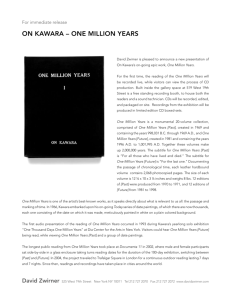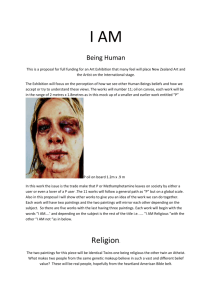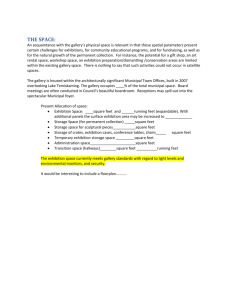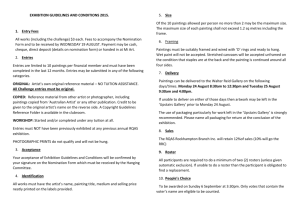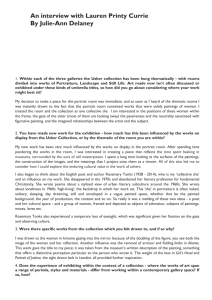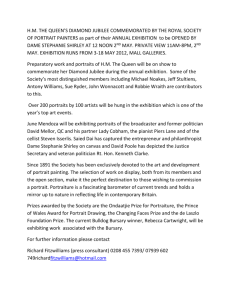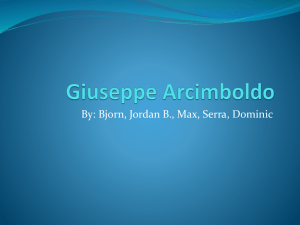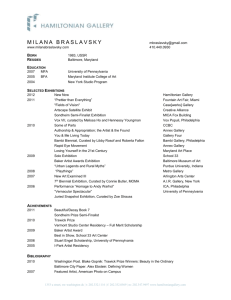Adobe Photoshop PDF
advertisement
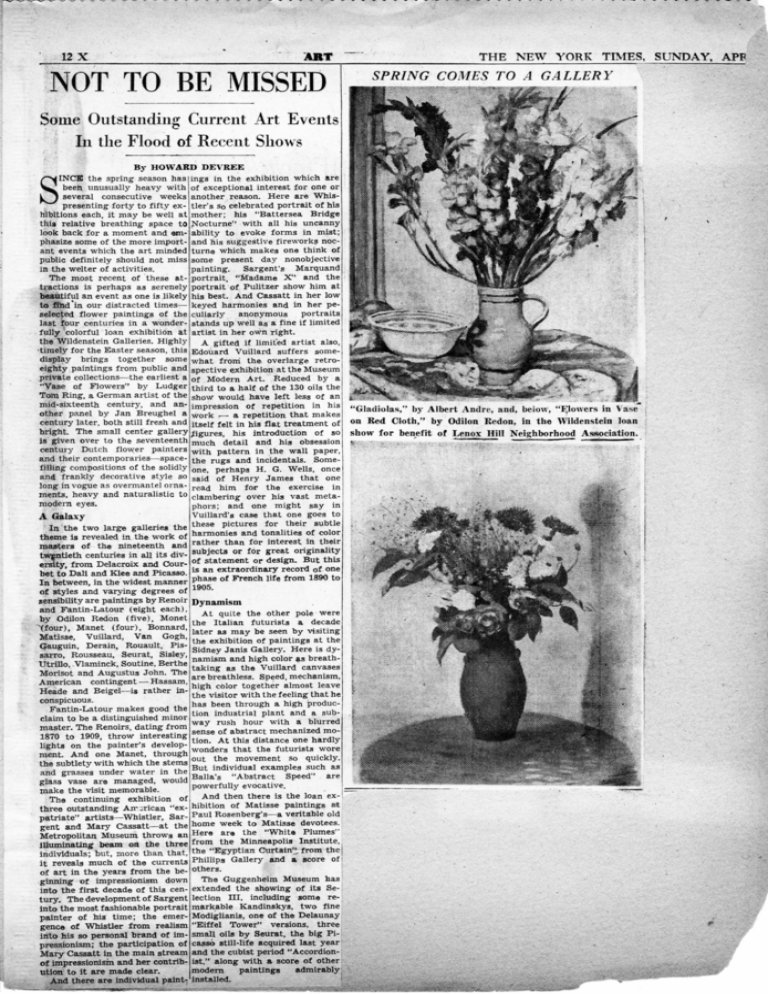
. 12 X DT .NOT . TO BE MISSED THE NEW YORK TIMES, SUNDAY, APF SPRING COMES TO A GALLERY Sdnie Outstanding Current Art Events In the Flood of Recent Shows · By HOWARD DEVREE the spring season has ings in the exhibition which are _ · beeh unusually heavy with of exceptional interest for one or several consecutive weeks another reason. Here are Whis. · presenting forty to fifty ex- tier's so celebrated portrait of his hlbltions each, it may be well at mother; his "Battersea Bridge t!'ia relative breathing space to ;Nocturne" with all his uncanny lao!( back for a moment and em-· ability to evoke forms in mist; phasize some of the more import- and l\is suggestive fireworkl! nocant events which the art minded turne which makes one think of public definitely should not miss some present day nonobjective in the welter of activities. painting. Sargent's Marquand , The most recent of ·these at- portrait, "lVfadame X" and the ' tractions is perhaps as serenely portrait ·of Pulitzer show him at bUUtiful an event as one is likely his best. And Cassatt in her low to ffh4 'in our distracted times- keyed harmonies and in her peselectE!d flower paintings of the culiarly anonymous portraits las.t ·f'our centuries in a: wonder- s"tands up well as a fine if limited fully . colorful ·Joan exhibition at artist in her own right. th-e Wi!denstein Galleries. Highly A gifted if limifed · artist also, •timely for the Easter season, this Edouard Vuillard suffers somedispl~y brings together some what from th~ overlarge retroe~ghty ,paintings from public and spective exhibition at the Museum private collections- the earliest a of Modern Art. · Reduced by a "Yase of Flowers" by Ludger third to a hal! of the 130 oils the Tam Ring, a German artist of the show would have left iess of an mid-sixteenth century, and an- impression o! repetition in h is oYt-er panel by Jan Breughel a work ..- a repetition that makes century later, both still fresh and itself felt in his flat treatment of brjg~t. The small center gallery .figures, his introduction of so is .gtven over to the seventeenth much detail and his obsession century Dutch flo~er painters with pattern in .t he wall paper, and thetr contemporanes- space- the rugs and incidentals. Somefillfng compositions of the solidly one, perhaps H. G. Wells·, once and 'frankly decorative style so said of Henry James that one long in vogue as overman tel orna- r ead him for the exercise in ments, heavy and naturalistic to clambering over his vast meta1"\lodern eyes. phors ; and one might say in A Galaxy Vuillard's case that one goes to ' in ··the two large galleries the these ~ictures for t~eir subtle theme is revealed in the work of harmomes and t~nahltes ?f col~r muter of, th nineteenth and rather than for mterest m thetr t~ti~h centueries in all its div- subjects or for great originali:y eisity from Delacroix and Cour- of statement or design. But thlS bet Dali and Klee and Picasso. is an extraordin~ record of. one In between in the widest manner phase of French life from 1890 to of styles a~d varying degrees of 1 905. s~nSibility_ are painting~ by Renoir Dynamism and F~ntm-Latour (~Ight each) , At uite the other ole . were by Odilon Redon (fiVe) , Monet q . . P (four) Manet (four) Bannard the Italian futunsts a. decade , ' . ' ' later as may be seen by vuttlng Matlss~, Vutll~rd, Van Go~h, the exhibition o! paintings at the Gaugum, Deram, Rouault, . Pts- Sidney Janis Gallery. Here is dySJlr~o, Rouss~au, Seur~t, Sisley, namism and high color as breathUtn~o, .Vlammck, Soutme. Berthe lakin as the Vuillard canvases Mortsot and Augustus John. The g . Am . t' t H are breathless. Speed, mechamsm, .e rtcan con_mge~ assa~ , high color together almost leave Head: and Beigel- ts rather m- the visitor with the feeling that he conspiCUOUS. . L t k d th has been through a. h"tgh pro d uce . . . b F ~~a=~~~ t , t b d" t ' · h d · lion mdustnal plant . and a su c1a1m o e a IS mgUts e mmor. master. The Renoirs, dating from way rush hour with a. blurred 909 th , t t· sense of abstract mechamzed mo1870 t o 1 row meres mg t " At th" d " t .0 e hardly ' !fghts on the painter's develop- ton. IS IS ance ~ ment. And one Manet, through wonders that the futunsts .wore the subtlety with which the stems out th~ _m ovement so quickly. . But indtvidual examples such as and grasses under water m the Balla' "Abstract s eed" are glass vase are managed, would s . P make the visit memorable. powerfully evocative. The continuing exhibition of And then there is the loan exthree outstanding A!T'.:Jrican "ex- hibition of Matisse paintings at patriate" artists--Whistler Sar- Paul Rosenberg's- a veritable old gent and Mary Cas~att-~t the home week to ~ati~se devotee~; Metropolitan Museum throws an Here are the White Plumes illuminating beam on the three from the Minneapolis- Institute, ~ individuals; but, mo re tll an that, the "Egyptian Curtain~ trom the it reveals much of the currents Phillips Gallery and a score of of art in the years from the be- others. ginning of impressionism down The Guggenheim Museum has into the first decade of this cen- extended the showing of its Setury. The development of Sargent lection III, including some rein to the most fashionable portrait mark.able Kandinskys, two fine painter of · his time; the emer- Modiglianis, one of the Delaunay gence of Whistler from realism "Eiffel Tower" versions, three into his so personal brand of im- small oil!! by Seurat, the big Pipresslonism; the participation of cas&O still-life acquired last year · Mary· CR.$att i!l the main stream ~d the cubist peliod "Accordionof impressionism and her contrib· 1st," along with a score of other ution' to it are made clear. modern paintings admirably -, Alld there are individual paint- installed. 8 ~ fNCE 0 ' td ....

